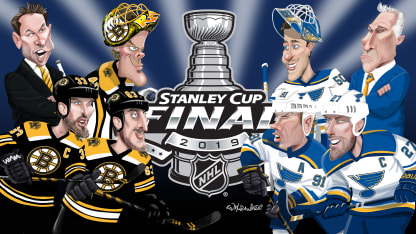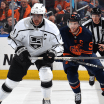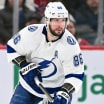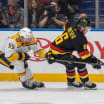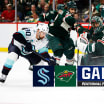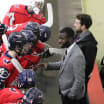Each team has scored 57 goals in the Stanley Cup Playoffs, each with 16 in the first period, 16 in the second, 24 in the third and one in overtime.
The Bruins' top line of Bergeron, Brad Marchand and David Pastrnak has scored 22 goals. The Blues' top line of Vladimir Tarasenko, Jaden Schwartz and Brayden Schenn has scored the same number.
St. Louis' fourth line of Alexander Steen, Oskar Sundqvist and Ivan Barbashev has combined for 17 points (eight goals, nine assists). Boston's fourth line of Sean Kuraly, Noel Acciari, Joakim Nordstrom and the injured Chris Wagner has combined for 13 (seven goals, six assists).
Bruins goalie Tuukka Rask has been arguably the best player in the playoffs with a 1.84 goals-against average and .942 save percentage in 17 starts. During his current seven-game winning streak, he has a 1.29 GAA and .961 save percentage.
Blues rookie goalie Jordan Binnington hasn't been as effective, with a 2.36 GAA and .914 save percentage in 19 games, but he has won three straight games allowing two goals on 77 shots (0.67 GAA, .974 save percentage).
Each team has a finalist for the Selke Trophy, the award given to the forward voted to best excel in the defensive aspects of the game. Bergeron is a four-time winner. Blues center Ryan O'Reilly is a first-time finalist.
"He does everything right," Bergeron said of O'Reilly.
"He's a guy that you look at for how to play the game," O'Reilly said of Bergeron.
RELATED: [Bruins vs. Blues series coverage | Teams can only dream of seeing Cup at Media Day]
Boston is allowing 1.94 goals-against and generating 30.0 hits and 14.53 blocked shots per game. St. Louis is at 2.53, 29.37 and 14.42.
"Both teams want to really get on the forecheck, be physical, be a hard team to play against," Blues coach Craig Berube said. "When they're extremely hard to play against, they battle, they play hard, their centermen play 200-foot games like ours do."
What then might be the difference in the series?
Experience could be. At least, that's what the Bruins want you to think.
They have seven players who have played in the Stanley Cup Final, including Rask, Bergeron, Marchand, defenseman Zdeno Chara, and center David Krejci, each a part of the team that won the Stanley Cup in 2011. Defenseman Torey Krug played with them in the 2013 Cup Final, and John Moore played in the 2014 Cup Final with the New York Rangers.
David Perron is the only Blues player who has played in the Cup Final, doing so with the Vegas Golden Knights last year.
"I just believe that our guys that have been there, that have won a Cup, have lost a Cup, that should give us an edge," Cassidy said. "Some people disagree with that once you're here, but I believe it will give us an edge."
The Blues disagree.
"Most of us have played in a championship game, Memorial Cup, Olympics, World Cup, whatever it is," St. Louis captain Alex Pietrangelo said. "Our experience is getting to this point. We just keep finding ways to win and you gain experience and learn from that."
